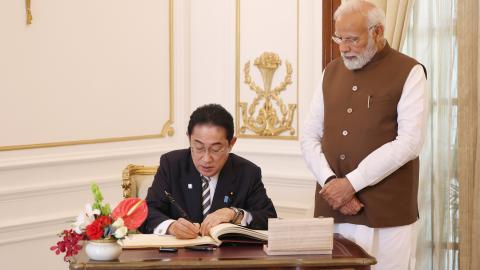In his visit to India last month, Japanese Prime Minister Kishida Fumio achieved a major step forward in bilateral relations. There are three factors in particular to note.
First, Kishida gave India its motivation back. He did this by announcing the “New Plan for a ‘Free and Open Indo-Pacific’” in India and underscoring its importance. The use of Indo-Pacific was originally intended to replace “Asia-Pacific” and include India. That is why Kishida’s predecessor Abe Shinzo, who first proposed the idea, presented the concept (or rather, the basis for it in the “Confluence of the Two Seas”) to India’s Parliament in 2007.
Since Russia invaded Ukraine, however, cooperation with India has suffered. India’s position on Russia is at odds with that of Japan (and those of the United States and Australia). Meanwhile, Abe, who captured the hearts of Indians with his Indo-Pacific advocacy, has been assassinated. Cooperation with Japan has consequently stalled on a lack of motivation.
It is to move beyond this that Kishida announced a concrete plan in India based on the Indo-Pacific. The fact that the announcement was made in India – where the Indo-Pacific concept was first introduced – plays to local pride and gives India reason to feel motivated again.
Second, it is important to note that Kishida’s plan was aimed at getting the Global South on the side of the Quad. With economic growth, the Global South has increasing clout and can no longer be ignored. It is at the forefront of China-U.S. competition, with China seeking to expand its influence through an enormously ambitious program of infrastructure construction with its Belt and Road Initiative, together with vaccine diplomacy. Meanwhile, since its invasion of Ukraine, Russia has been in a struggle with the West to win the support of the Global South.
That support could be a key factor in determining future outcomes. After World War I, there were 32 nations on the side that won the war and four on the side that lost. After World War II, there were 54 winners and eight losers. In the Cold War, 54 nations were part of the triumphant West and 26 allied to the former Soviet Union. Clearly, there is a tendency for the side that has the support of the most countries to emerge the winner.
Meanwhile, this year Japan chairs the G-7 while India is presiding over the G-20. Together, then, Japan and India are playing leading roles, which will include persuading the Global South. That is why India is serious about the G-20 this year, holding over 200 events in more than 50 cities.
Yet Japan’s Foreign Minister Hayashi Yoshimasa was absent from the G-20 Foreign Ministers’ Meeting in India in early March, humiliating Delhi which had prepared seriously for the event. Had Japan invited the Indian prime minister as a guest to the G-7 under those circumstances, he likely would not have come.
Kishida’s visit to India has rectified this. The Japanese prime minister visits India, and the Indian prime minister reciprocates with a visit to Japan. Japan and India have been able to work together to rebuild the system for implementing Global South measures by linking the G-7 and the G-20.
The third reason why Kishida’s visit to India was a big step has to do with his visit to Ukraine. Kishida originally announced that he would visit India from March 19 to 22. In fact, he left India for Ukraine via Poland on March 20. This would have required Japan to explain the prime minister’s plan to India in advance. When the prime minister left India on March 20, India would still have had responsibility for his security. In other words, Kishida’s visit to Ukraine was the first secret diplomatic operation involving cooperation between Japan and India since the war in Ukraine began. This builds trust.
These reasons combined made Kishida’s visit to India one of historical importance. If the Indo-Pacific is to develop based on cooperation between Japan and India, then this visit will be seen as having played a significant role.















